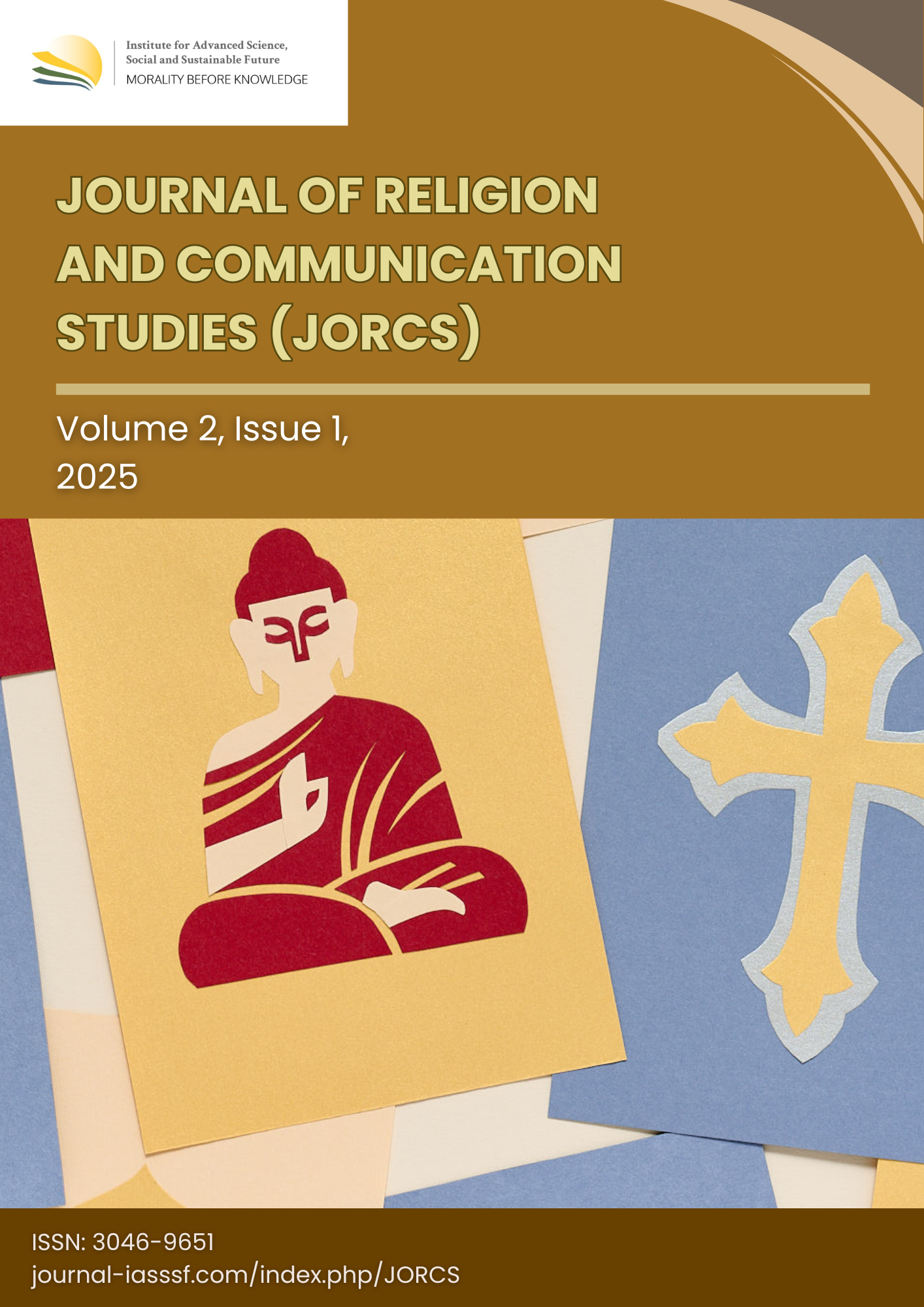The evolution of fiqh in the digital era: Challenges and adaptations in islamic jurisprudence
DOI:
https://doi.org/10.61511/jorcs.v2i1.2025.1751Keywords:
digital era, fiqh, islamic jurisprudence, islamic law, technological adaptationAbstract
Background: The rapid advancement of digital technology has significantly transformed various aspects of human life, including Islamic jurisprudence (fiqh). As a discipline that provides legal guidance for Muslims, fiqh must continuously adapt to new challenges brought by digitalization. This study examines how fiqh evolves in response to contemporary digital developments and their implications for Islamic law and daily Muslim practices. Methods: This research employs a qualitative descriptive method, utilizing primary and secondary sources from print and electronic media related to fiqh in the digital era. Data were collected through literature review, analyzed using thematic categorization, and validated through triangulation to ensure reliability and contextual accuracy. Findings: The study reveals that fiqh remains dynamic and flexible in addressing modern challenges such as online transactions, artificial intelligence in financial decision-making, and ethical concerns in social media usage. While technology provides convenience, it also raises new fiqh-related questions requiring scholarly ijtihad. Additionally, the digital era has influenced the process of issuing and disseminating fatwas, necessitating innovative approaches to maintain their validity and authority. Conclusion: Fiqh in the digital era must balance technological advancements with core Islamic principles. The role of scholars and fatwa institutions is crucial in ensuring that digital transformation aligns with sharia guidelines. Continuous adaptation is essential to preserve the relevance of Islamic law in modern society. Novelty/Originality of this article: This study uniquely highlights how fiqh interacts with emerging digital challenges, emphasizing its importance in guiding Muslims to integrate technological advancements within Islamic ethical and legal frameworks.
References
Ab Rahim, S. F., Ab Rahman, M. F., Thaidi, H. A. A., Mohd, N. N. M. A. N., & Jailani, M. R. (2025). Artificial Intelligence for Fatwa Issuance: Guidelines And Ethical Considerations. Journal of Fatwa Management and Research, 30(1), 76-100. https://doi.org/10.33102/jfatwa.vol30no1.654
Al-Baijuri, M. (2010). Fiqh Kontemporer: Kajian Hukum Islam di Era Modern. Pustaka Ilmu.
An-Nawawi, I. (2005). Al-Majmu’ Syarh Al-Muhadzdzab. Dar al-Minhaj.
Anshari, M., Almunawar, M. N., Masri, M., & Hrdy, M. (2021). Financial technology with AI-enabled and ethical challenges. Society, 58(3), 189-195. https://doi.org/10.1007/s12115-021-00592-w
Arkoun, M. (2002). The Unthought in Contemporary Islamic Thought. Saqi Books.
Arthamevia, Z. A., Azzahra, H. V., Abbas, Z. A. A., Anifan, M., Prayogi, A., & Pujiono, I. P. (2024). Implementasi Kegiatan Keputrian Sebagai Upaya Penguatan Karakter Islami Siswi Sman 1 Bodeh Pemalang. Al-Nizam: Indonesian Journal of Research and Community Service, 2(2). https://journal.muntahanoorinstitute.com/index.php/al-nizam/article/view/113
Djalaluddin. (1991). Islam dan Pembangunan. Pustaka Al-Husna.
Fadilah, N., Hamdani, H., Asnawi, A. R., Rizaq, M., Faizah, S. I., Prayogi, A., ... & Widagdo, H. H. (2023). Perkembangan studi islam. Literasi Nusantara Abadi Grup.
Halimah, L. N., Riyadi, S., Jurjani, A. F., Prayogi, A., & Laksana, S. D. (2025). Implementasi Penggunaan Machine Learning Dalam Pembelajaran: Suatu Telaah Deskriptif. Reskilling, 1(1), 1-10. https://journal.ajbnews.com/index.php/Reskilling/article/view/82
Haruna, M. (2019). Pengantar Ilmu Fikih. Pustaka Pelajar.
Henry, A. M. (2021). Religious literacy in social media: A need for strategic amplification. Religion & Education, 48(1), 89-101. https://doi.org/10.1080/15507394.2021.1876507
Lee, J. (2020). Access to finance for artificial intelligence regulation in the financial services industry. European Business Organization Law Review, 21(4), 731-757. https://doi.org/10.1007/s40804-020-00200-0
Mahfudz, A. (2019). Dinamika Hukum Islam: Dari Klasik hingga Kontemporer. Mizan.
Muzlifah, I. (2013). Fiqh dan Spiritualitas dalam Era Digital. Suara Ilmu.
Nasihin, A. (2019). Modal Syariah dalam Industri Halal Digital. Jurnal Ekonomi Islam, 10(3), 201-218.
Oktaviani, L., Prayogi, A., Pujiono, I. P., Riyadi, R., & Nasrullah, R. (2024). Upaya Guru PAI dalam Menanamkan Kesadaran Salat Zuhur Berjemaah di Sekolah. Jurnal Man-anaa, 1(1), 1-11. https://e-journal.staimaswonogiri.ac.id/index.php/man-anaa/article/view/217
Prayogi, A. (2024). Pentingnya Mengenal Agama Islam Dalam Kehidupan Modern. Mega Press Nusantara.
Prayogi, A., Nasrullah, R., Mutaqin, B. K., & Syaifuddin, M. (2024a). Relevansi Penerapan Metode Ceramah Plus Dalam Pembelajaran Pai Di Era Digital. ALMUSTOFA: Journal of Islamic Studies and Research, 1(2), 33-39. https://ejournal.bamala.org/index.php/almustofa/article/view/242
Prayogi, A., Nasrullah, R., Setiawan, S., Setyawan, M. A., & Syaifuddin, M. (2025a). Characteristics of Tutoring Students' Learning Styles: A Descriptive Study. JELE: Journal of English Literature and Education, 1(1), 8-14. https://darussalampalbar.com/index.php/jele/article/view/13
Prayogi, A., Pujiono, I. P., Nasrullah, R., & Setiawan, S. (2025b). Pelatihan Pengerjaan Soal-Soal TWK untuk Menghadapai SKD Sekolah Kedinasan bagi Siswa SMA Sederajat. Journal of Community Research & Engagement, 1(2), 345-253. https://doi.org/10.60023/6y1r4y39
Prayogi, A., Setyawan, M. A., Prabowo, D. S., & Aripin, U. (2024b). Istinbath Method Of Islamic Law: A Descriptive Study. AL MIDAD: Jurnal Ilmu Pendidikan dan Studi Keislaman, 1(1), 1-13. https://ejournal.staidhtulungagung.ac.id/index.php/almidad/article/view/25
Pujiono, I. P. (2020). Pemanfaatan Youtube Untuk Memperoleh Passive Income Bagi Pengajar Di Akn Kajen. Jurnal Difusi, 3(1), 62-62. https://doi.org/10.35313/difusi.v3i1.1950
Rahman, M. E., Syahriani, F., & Jampa, W. (2024). Islamic Law in Tthe Digital Era: Artificial Intelligence as A Revolutionary Legal Tool in The 21st Century. Al-Hurriyah: Jurnal Hukum Islam, 9(2), 102-115. https://doi.org/10.30983/al-hurriyah.v9i2.8545
Ridzuan, N. N., Masri, M., Anshari, M., Fitriyani, N. L., & Syafrudin, M. (2024). AI in the financial sector: The line between innovation, regulation and ethical responsibility. Information, 15(8), 432. https://doi.org/10.3390/info15080432
Sucianingtyas, R., Falistya, L. R., Pujiana, S., Prayogi, A., & Laksana, S. D. (2025). Telaah Ragam Artificial Inteligence (AI) Dalam Pendidikan. Madani: Jurnal Ilmiah Multidisiplin, 3(2), 232-243. https://doi.org/10.5281/zenodo.14874510
Sumitro, A. (2014). Fikih Kontemporer: Menjawab Tantangan Zaman. Mizan.
Syakhroni, M., & Yudistira, A. (2022). Sejarah Perkembangan Islam: Dari Masa Abbasiyah hingga Era Digital. Gema Ilmu.
Wahid, S. H. (2024). Research Insights on Online Fatwas. A Comprehensive Systematic Literature Review. Journal of Fatwa Management and Research, 29(1), 23-46. https://doi.org/10.33102/jfatwa.vol29no1.570
Wahyuni, R. (2013). Ekonomi Islam dan Tujuan Kemakmuran. Al-Falah.
Zakirun, M. (2021). Empat Imam Mazhab dan Kontribusinya terhadap Fikih Islam. Pustaka Amanah.
Zulfadli, & Hidayati, N. (2020). Dinamika Fikih di Era Digital. Prenadamedia Group.
Downloads
Published
How to Cite
Issue
Section
Citation Check
License
Copyright (c) 2025 Arditya Prayogi, Riki Nasrullah, Singgih Setiawan

This work is licensed under a Creative Commons Attribution 4.0 International License.














